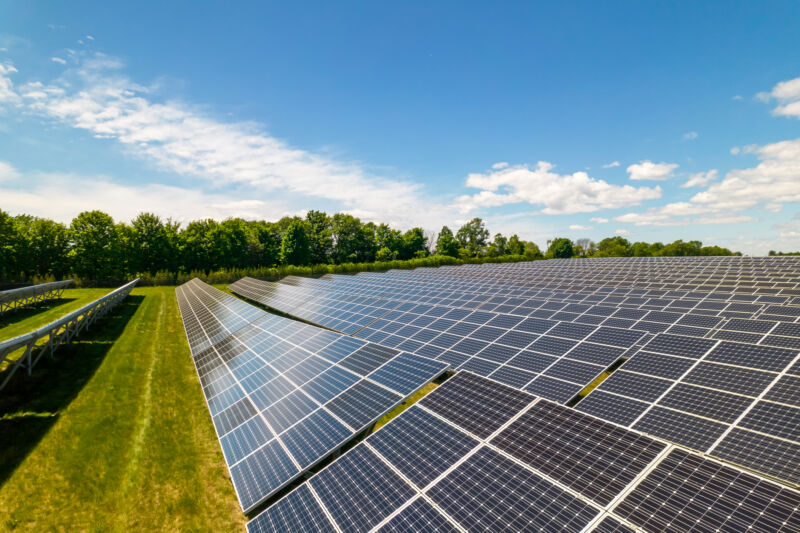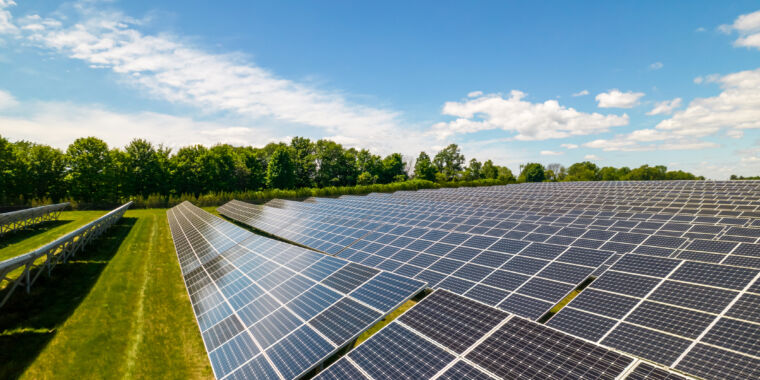Bipartisan consensus in favor of renewable power is ending

One of the most striking things about the explosion of renewable power that’s happening in the US is that much of it is going on in states governed by politicians who don’t believe in the problem wind and solar are meant to address. Acceptance of the evidence for climate change tends to be lowest among Republicans, yet many of the states where renewable power has boomed—wind in Wyoming and Iowa, solar in Texas—are governed by Republicans.
That’s partly because, up until about 2020, there was a strong bipartisan consensus in favor of expanding wind and solar power, with support above 75 percent among both parties. Since then, however, support among Republicans has dropped dramatically, approaching 50 percent, according to polling data released this week.

Renewables enjoyed solid Republican support until recently.
To a certain extent, none of this should be surprising. The current leader of the Republican Party has been saying that wind turbines cause cancer and offshore wind is killing whales. And conservative-backed groups have been spreading misinformation in order to drum up opposition to solar power facilities.
Meanwhile, since 2022, the Inflation Reduction Act has been promoted as one of the Biden administration’s signature accomplishments and has driven significant investments in renewable power, much of it in red states. Negative partisanship is undoubtedly contributing to this drop in support.
One striking thing about the new polling data, gathered by the Pew Research Center, is how dramatically it skews with age. When given a choice between expanding fossil fuel production or expanding renewable power, Republicans under the age of 30 favored renewables by a 2-to-1 margin. Republicans over 30, in contrast, favored fossil fuels by margins that increased with age, topping out at a three-to-one margin in favor of fossil fuels among those in the 65-and-over age group. The decline in support occurred in those over 50 starting in 2020; support held steady among younger groups until 2024, when the 30–49 age group started moving in favor of fossil fuels.

Among younger Republicans, support for renewable energy remains high.
Democrats, by contrast, break in favor of renewables by 75 points, with little difference across age groups and no indication of significant change over time. They’re also twice as likely to think a solar farm will help the local economy than Republicans are.
Similar differences were apparent when Pew asked about policies meant to encourage the sale of electric vehicles, with 83 percent of Republicans opposed to having half of cars sold be electric in 2032. By contrast, nearly two-thirds of Democrats favored this policy.
There’s also a rural/urban divide apparent (consistent with Republicans getting more support from rural voters). Forty percent of urban residents felt that a solar farm would improve the local economy; only 25 percent of rural residents agreed. Rural residents were also more likely to say solar farms made the landscape unattractive and take up too much space. (Suburban participants were consistently in between rural and urban participants.)
What’s behind these changes? The single biggest factor appears to be negative partisanship combined with the election of Joe Biden.

For Republicans, 2020 represented an inflection point in terms of support for different types of energy. That wasn’t true for Democrats.
Among Republicans, support for every single form of power started to change in 2020—fossil fuels, renewables, and nuclear. Among Democrats, that’s largely untrue. Their high level of support for renewable power and aversion to fossil fuels remained largely unchanged. The lone exception is nuclear power, where support rose among both Democrats and Republicans (the Biden administration has adopted a number of pro-nuclear policies).
This isn’t to say that non-political factors are playing no role. The rapid expansion of renewable power means that many more people are seeing facilities open near them, and viewing that as an indication of a changing society. Some degree of backlash was almost inevitable and, in this case, the close ties between conservative lobbyists and fossil fuel interests were ready to take advantage of it.
Bipartisan consensus in favor of renewable power is ending Read More »
